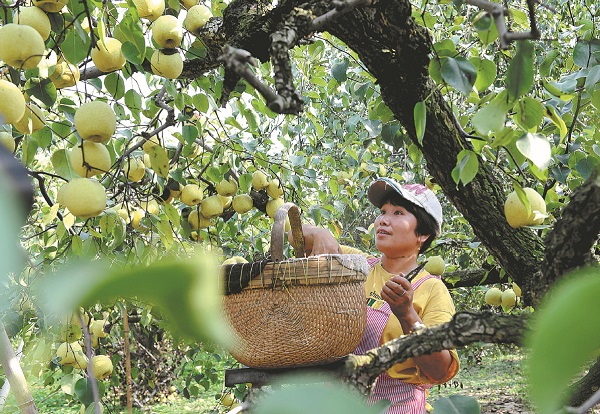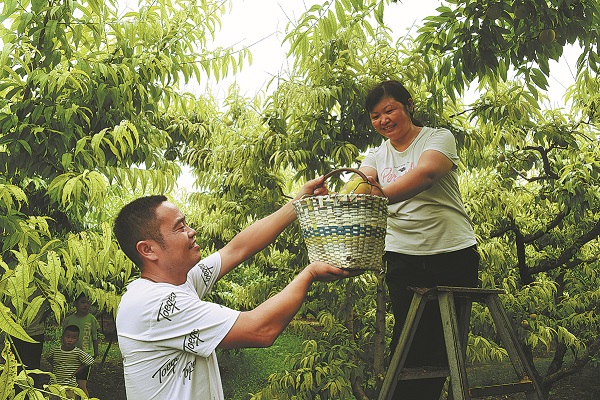Pears, peaches offer taste of the future

A worker picks suli, or crisp pears, in Dangshan county, Suzhou city, Anhui province, in September 2019. [Photo by Miao Yucai/for China Ddily]
Entrepreneurs are updating farming techniques in a county in rural East China. Zhu Lixin reports from Suzhou, Anhui.
If Dangshan county in the eastern province of Anhui distributed locally grown fruit to every one of the country's 1.4 billion people, they would each receive more than 1 kilogram.
With annual output of 1.7 million metric tons, the county, which has a population of 1 million, is one of China's largest fruit-cultivation bases, according to the Dangshan government's calculations.
"With such a large output volume, marketing could be a huge challenge for local planters," said Duan Xuxu, founder of a startup that processes pears.
In 2015, Duan, who has a doctorate in finance, quit her job at a private equity fund in Shanghai and moved to Dangshan, which is administered by Suzhou city and is close to Huaibei, her hometown, in Anhui.
More than 70 percent of the county's fruit output consists of Dangshan's suli, or crisp pears, a local species known for its large size, juiciness and sweet taste.

Farmers from Lintun village, Dangshan, harvest peaches last month. [Photo provided to China Daily]]
Sales setback
Duan rented more than 133 hectares of pear orchards from local farmers and expected to make a good profit from the species' fame. She thought the organic, pollution-free plantation would help her win market share.
However, when the first harvest season came in the fall of 2016, she was frustrated by the poor sales of the fresh fruit.
"Ordinary customers see organic fruit as misshapen, while high-end consumers still need to be persuaded to trust the quality," said Duan, adding that she believes good opportunities lie in the nation's rural vitalization strategy.
In 2012, the central authorities listed Dangshan as a national key county for poverty alleviation.
At the time, more than 140,000 of its 1 million residents were defined as poverty-stricken, according to the Suzhou government. Meanwhile, the State Council, China's Cabinet, said the poverty threshold, which rose every year, was annual net income of 2,300 yuan ($355) per person.
In 2015, the China Food and Drug Administration, the predecessor of the National Medical Products Administration that was founded three years later, was ordered to help alleviate poverty in Dangshan.
The NMPA sends an official to Dangshan to serve as deputy county mayor and another as first Party secretary of Lintun village. Each serves a two-year term.
In 2014, the State Council mobilized about 1 million poverty alleviation workers to survey the country's impoverished population and open personal files for each poor person.
The result of the survey showed that more than 20 percent of Lintun's roughly 5,000 residents were poverty-stricken.
Instead of pears, the fruit most planted in Lintun is the yellow peach, fields of which cover more than 300 of the 400 hectares of agricultural land in the village.
"The fruit was favored by local canning factories, and one of their main markets was the United States," said Zhang Nianliang, who finished his term as first Party secretary in Lintun last month.
"When I arrived at the village two years ago, some canning factories had failed to buy peaches from the farmers. Later, I learned that their business had been affected by trade frictions between China and the US."
Thanks to his efforts and those of his predecessors, some young, well-educated returnees to the village started e-commerce businesses, which helped relieve the sales pressure to a certain extent, he said.
In 2017, veteran Wang Xiaohui returned to his hometown in Dangshan to sell pears via e-commerce platforms.
"My father used to sell fruit on the street, but a whole day's toil would only amount to 200 yuan at most," he said, adding that traditional peddling is a tough way to make a living.
On the right track
In 2019, Dangshan was removed from the national list of key counties slated for poverty alleviation as a result of generally successful efforts across the area.
"Being removed from the list doesn't mean that every poverty-stricken household has been lifted out of poverty," Zhang said.
He added that members of his administration continue to offer assistance to the county's vitalization efforts.
"To put Lintun on the right track for steady development, many things have to be accomplished," he said. He noted that industrialization is one of the key elements.
In 2017, Duan and other investors founded Anhui Liduobao Biotechnology. The company mainly focuses on producing pear syrup, a thick liquid containing protocatechuic acid, which is believed to be effective in relieving coughs.
The startup sells the pear syrup as a final product of the processing procedure and also uses it to produce popular items such as candy.
Duan said a trial run was successful, so she rented more land to enlarge the orchard. In 2019, Zhang Ying, the deputy county mayor appointed by the NMPA, helped connect Anhui Liduobao with a pharmaceutical company from Shandong province, Anhui's northern neighbor.
Anhui Liduobao provides pear syrup to the company as raw material for a popular traditional Chinese medicine that is sold by pharmacies.
It takes about 11 kg of fresh pears to make 1 kg of pear syrup as a packaged final product, priced at more than 100 yuan. If the fruit were sold to an intermediary, it would only fetch 11 yuan, according to Duan's calculations.
Last year, the company processed about 34,000 tons of pears, but its cultivation base only produced 7,000 tons.
The other 27,000 tons were purchased from local farmers, with half coming from previously poverty-stricken households.
